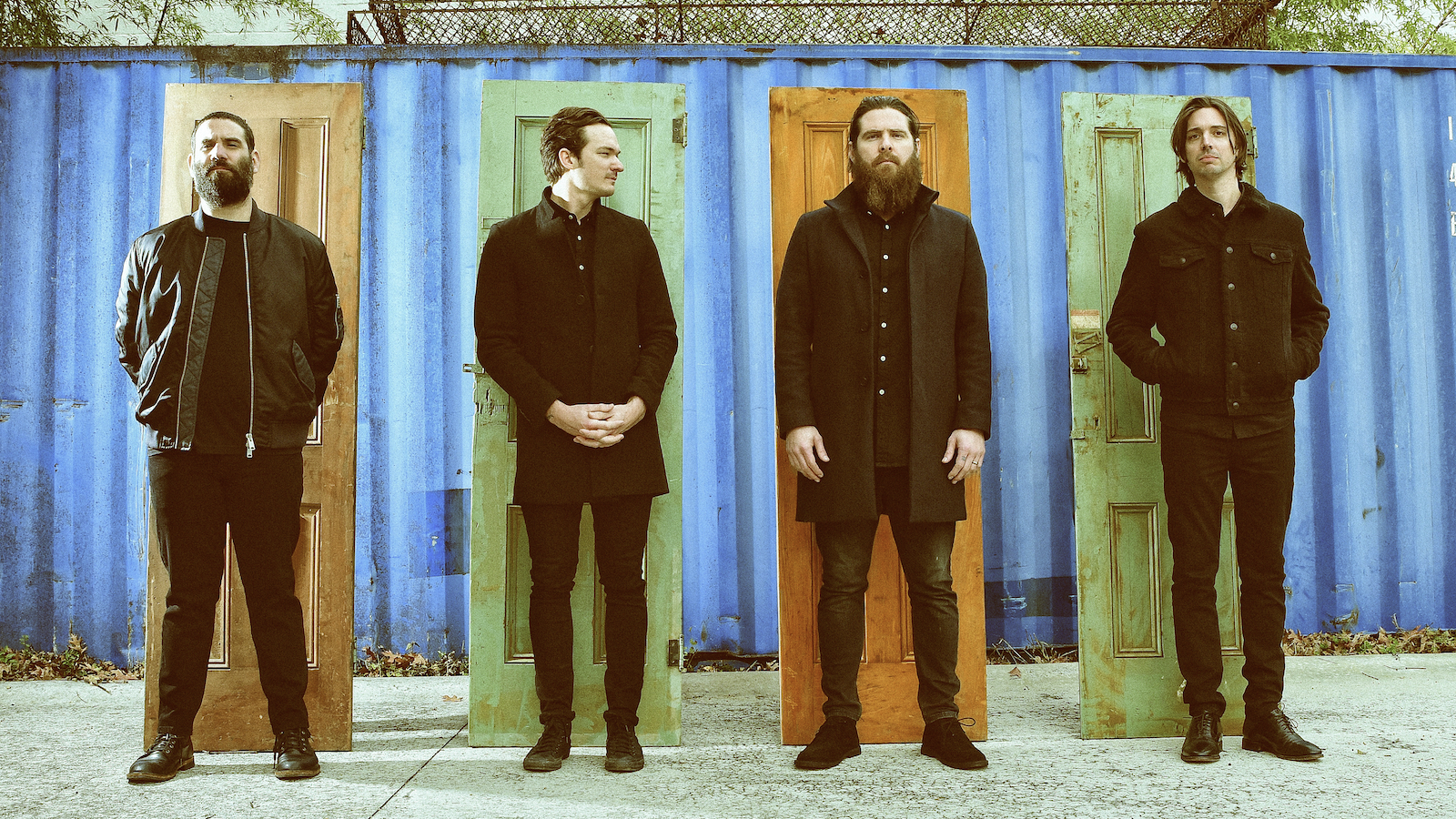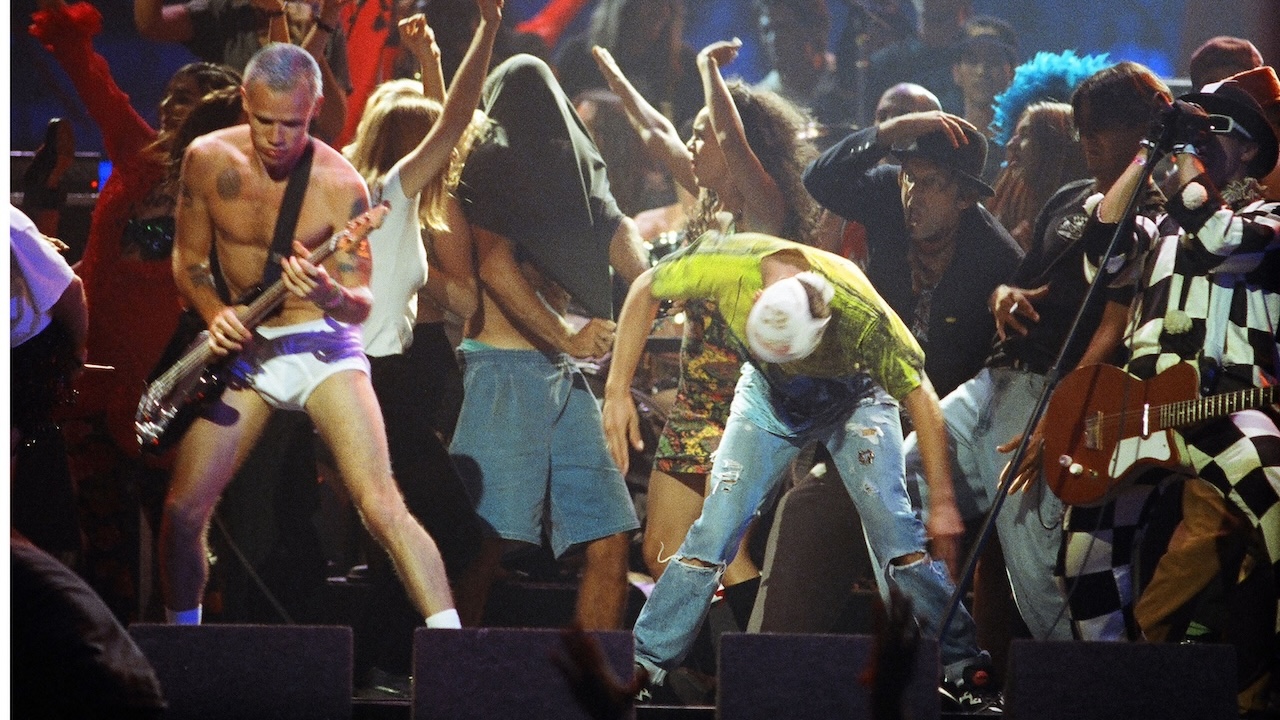Manchester Orchestra’s Andy Hull: “It was like we had only finished the edges of a 2,000-piece puzzle, and then we had to figure out the insides”
On The Million Masks Of God, Manchester Orchestra amp up the intensity tenfold with their sharpest, boldest and most opulent epic yet

All the latest guitar news, interviews, lessons, reviews, deals and more, direct to your inbox!
You are now subscribed
Your newsletter sign-up was successful
Whether intentional or not, most albums are purpose-built for certain moods and backdrops – be it an emo record fitting for late-night existential crises under a fort of blankets, a hard-rock scorcher suited for blaring car stereos with the wind rippling through your hair, or a punk opus that offers some much-needed energy while you’re shredding at the gym. In the case of the latest epic from Atlantan indie-rockers Manchester Orchestra, we’d recommend dimming the lights, sparking up some incense, sinking into your comfiest recliner and breaking out the good headphones, cranking that volume up to 11 and allowing The Million Masks Of God to drag you deep into its world.
A follow-up to 2017’s Americana-flavoured Black Mile To The Surface, LP6 expands the broad, lofty palate of tones and tenacities that Manchester Orchestra have to play with. The guitars feel a tad more understated – and we know, that’s likely not what you’ve come to read in a magazine all about guitars, but trust us when we say that less is undoubtedly more on The Million Masks Of God. The band use minimalism and sparseness to magnify the key elements of each track, making them all feel as grandiose and goosebump-inducing as possible.
In-between repeat listens of this labyrinthine masterpiece, Australian Guitar caught up with frontman Andy Hull to learn how The Million Masks Of God bloomed from the rubble of an untimely death.
One of the words I saw come up a lot in the Black Mile era, which will undoubtedly follow into this one, is ‘cinematic’. And it’s fitting because these are very cinematic records – very grand and opulent soundscapes with really complex storytelling. When you’re hashing out the blueprint for a record like this, do you write it on the basis that it’s meant to be heard as one cohesive body of work?
I think the idea is that, yes, we know it will be interpreted like that, but it’s okay that the writing doesn’t have to be that immediately. We’re writing these from honesty and from real life experiences, and it’s really more about collecting those than telling a narrative. It’s like fishing, y’know, you spend your time out by the pond and you just keep throwing in your reel and hoping that something comes out.
The great part about having the band that I have, and the thinkers around us when we make a record, is that everyone buys in. That helps a lot. The idea for this record came pretty early on, but it was like we had only finished the edges of a 2,000-piece puzzle, and then we had to figure out the insides and how the whole thing connected together.
There’s a quote from the press release that stuck out to me – that “where Black Mile was anchored by the journey of birth to death, The Million Masks Of God stands as a companion piece exploring what comes next.” What made you want to continue down that rabbithole?
I think musically – and I’m guessing you would agree – it doesn’t really sound like Black Mile; it’s not that record. Conceptually, I suppose that’s what the connection was – and I think the reason I’m going to keep diving down that rabbithole is because it’s just sort of, like, the great existential question I’ll always have now, being a parent.
And then being extremely close with my best friend Robert, who’s father passed a short while ago – about half the record was written before his passing, and half of it was written after; and that was definitely a moment where I started to put together all the connections of what ending a life meant, I guess.
All the latest guitar news, interviews, lessons, reviews, deals and more, direct to your inbox!
Black Mile was really focussed on going, “Man, what can I do as a dad?” And then this record turned into a musing on the fact that everyone has an expiration date – how do you deal with that emotion, and those you leave behind? It’s all sorts of messy feelings, but that was the thing that gave us the inspiration to figure out how these things were all connected.
I think the guitar plays an interesting role on this album. It very much carries the record and is still the biggest element of your sound, but the mix isn’t always built around it; sometimes the guitar sounds more ancillary, or used in the way a synth or a string part typically would.
I will say that a big part of letting go of being a rhythm player – as far as being a ‘rock’ guitarist goes – was having our bass player, Andy Prince, be a part of this album. He’s essentially playing lead bass most of the time, which is just awesome. He’s so beyond talented, and the connection between he and Tim [Very], our drummer, was a really, really important thing for the basis of what this album would become.
We wanted to leave the very first sessions for Million Masks with bass and drum tracks where, if you listened to those tracks on their own, it would be an enjoyable listen – you could still pop just the bass and drums on and go, “Yeah, this is some pretty good music.” I was recognising how great those guys were and how collaborative they are on their sounds – and because of that, I felt less of a need to have that really chunky guitar stuff. Because that’s what he’s doing – you’re hearing a dude playing a four-string bass that sounds like five guitars, so I didn’t need to put five guitars on there anymore. And I like that stuff!
I’ve played enough rhythm guitar in my time, y’know? It’s certainly important in moments, but it just felt good to step back. The two of them locked it down so much that Robert and I were able to just dream over it and think of all the ideas we could pop on top of their tracks.
Do you see elements of tone and tension as a way to convey emotions on their own accord?
I would certainly say that the way that we sequenced the album, we really wanted it to have the feeling of what a human life might feel like. So it’s this sort of frantic birth, and then the angst and the feeling of… Y’know, life –figuring out what it is to be an adult human being. And knowing we were going for that – allowing the record to sort of lay the listener down – felt pretty poignant to us. So yeah, I think instrumentally and conceptually, everything was tied together. It was cool to try something different in that sense.
Do you see an importance in experimentation?
Yeah, I think that’s wildly important. The term ‘experimentation’ often gets a bad rap because it sounds like a bunch of people banging pots and pans together and seeing if it sounds cool… And it actually kind of is that, y’know?
Ethan Guska, one of the producers on the record – he was there from day one of the recording, right ’til the end, and we were finishing the record in his studio in LA; he would kick a Coke can by accident, and then turn to us and go, “Woah, did you hear that!?” And you’re sort of told that that’s nerdy and not cool – but it is cool! If you can use those sounds to create big ideas and things you’d never otherwise think of… That stuff is awesome.
Y’know, something Catherine [Marks, producer] would say a lot during Black Mile, and also during this record, was, “Just don’t plan on ending it. If a song ends and you feel like you have more to do, do more.” And that feeling of just being like, “Man, we can kind of do whatever we want,” at that very vulnerable initial stage where it’s just four guys standing in a room, looking at each other and being recorded… Yeah, that made a huge difference.

Ellie Robinson is an Australian writer, editor and dog enthusiast with a keen ear for pop-rock and a keen tongue for actual Pop Rocks. Her bylines include music rag staples like NME, BLUNT, Mixdown and, of course, Australian Guitar (where she also serves as Editor-at-Large), but also less expected fare like TV Soap and Snowboarding Australia. Her go-to guitar is a Fender Player Tele, which, controversially, she only picked up after she'd joined the team at Australian Guitar. Before then, Ellie was a keyboardist – thankfully, the AG crew helped her see the light…
